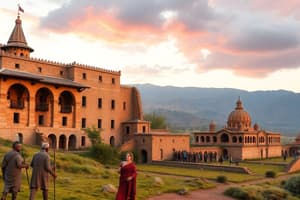Podcast
Questions and Answers
What defines the Prehistoric Era?
What defines the Prehistoric Era?
- Significant technological innovations
- Development of nomadic cultures (correct)
- Emergence of written records
- Rise of major civilizations
Which civilizations are primarily associated with Ancient History?
Which civilizations are primarily associated with Ancient History?
- Ottoman Empire, Holy Roman Empire
- Soviet Union, United States
- Mesopotamia, Egypt, Indus Valley (correct)
- Mongol Empire, Byzantine Empire
What was a significant characteristic of Medieval History?
What was a significant characteristic of Medieval History?
- The onset of the Industrial Revolution
- Development of modern democracy
- Feudalism in Europe (correct)
- Rise of global trade routes
Which event marks the transition into the Early Modern Period?
Which event marks the transition into the Early Modern Period?
What does historiography refer to in historical studies?
What does historiography refer to in historical studies?
Which of the following is an example of a primary source?
Which of the following is an example of a primary source?
Which theme in history examines class structures and migrations?
Which theme in history examines class structures and migrations?
Who is a key figure from the Modern era known for advocating civil rights?
Who is a key figure from the Modern era known for advocating civil rights?
Flashcards are hidden until you start studying
Study Notes
Overview of History
- Definition: The study of past events, particularly in human affairs, cultures, and civilizations.
- Importance: Helps understand societal developments, influences on the present, and patterns that may inform the future.
Major Historical Periods
-
Prehistoric Era
- Time before written records.
- Includes the Stone Age, Bronze Age, and Iron Age.
- Key developments: tool-making, agriculture, and the rise of nomadic cultures.
-
Ancient History (circa 3000 BC to 500 AD)
- Emergence of civilizations (Mesopotamia, Egypt, Indus Valley, China).
- Development of writing (cuneiform, hieroglyphs).
- Notable empires: Roman Empire, Persian Empire, Maurya and Gupta Empires.
-
Medieval History (500 AD to 1500 AD)
- Feudalism in Europe and the rise of Islamic Caliphates.
- Significant events: the Crusades, the Black Death, and the onset of the Renaissance.
-
Early Modern Period (1500 AD to 1800 AD)
- Transition from medieval to modern societies.
- Major events: Age of Discovery, Reformation, Enlightenment.
- Innovations in science, politics, and philosophy.
-
Modern History (1800 AD to Present)
- Industrial Revolution and its global impact.
- Major conflicts: World War I, World War II, Cold War.
- Social changes: civil rights movements, globalization, technological advancements.
Key Historical Concepts
- Chronology: Understanding timelines, sequences of events.
- Historiography: Study of historical writing and perspectives.
- Primary vs. Secondary Sources:
- Primary: Original documents, artifacts, eyewitness accounts.
- Secondary: Analyses, interpretations, and summaries of primary sources.
Important Historical Figures
- Ancient: Hammurabi, Socrates, Julius Caesar, Confucius.
- Medieval: Charlemagne, William the Conqueror, Genghis Khan.
- Modern: Napoleon Bonaparte, Mahatma Gandhi, Martin Luther King Jr.
Methods of Studying History
- Critical Analysis: Examining sources for bias and perspective.
- Comparative History: Analyzing similarities and differences across different times/places.
- Oral History: Collecting and studying historical information from personal testimonies.
Themes in History
- Political: Power, governance, revolutions.
- Economic: Trade, industrialization, globalization.
- Social: Class structures, gender roles, migrations.
- Cultural: Religion, art, philosophy, and technological advancements.
Tips for Studying History
- Focus on understanding connections between events.
- Take timelines into consideration for context.
- Use multiple sources for diverse perspectives.
- Engage with maps to visualize geographical impacts on history.
Definition of History
- The study of past events, especially in relation to human affairs, cultures, and civilizations.
- Understanding history helps us understand societal developments, influences on the present, and patterns that may inform the future.
Major Historical Periods
-
Prehistoric Era:
- Time before written records.
- Includes the Stone Age, Bronze Age, and Iron Age.
- Key developments include tool-making, agriculture, and the rise of nomadic cultures.
-
Ancient History (circa 3000 BC to 500 AD):
- Emergence of civilizations in Mesopotamia, Egypt, the Indus Valley, and China.
- Development of writing systems, like cuneiform and hieroglyphs.
- Notable empires include the Roman Empire, Persian Empire, Maurya Empire, and Gupta Empires.
-
Medieval History (500 AD to 1500 AD):
- Characterized by feudalism in Europe and the rise of Islamic caliphates.
- Significant events include the Crusades, the Black Death, and the onset of the Renaissance.
-
Early Modern Period (1500 AD to 1800 AD):
- Transition from medieval to modern societies.
- Includes the Age of Discovery, the Reformation, and the Enlightenment.
- Innovation in science, politics, and philosophy.
-
Modern History (1800 AD to Present):
- Marked by the Industrial Revolution and its global impact.
- Includes major conflicts such as World War I, World War II, and the Cold War.
- Social changes include civil rights movements, globalization, and technological advancements.
Key Historical Concepts
- Chronology: Understanding timelines and sequences of events.
- Historiography: The study of historical writing and perspectives.
- Primary Sources: Original documents, artifacts, and eyewitness accounts.
- Secondary Sources: Analyses, interpretations, and summaries of primary sources.
Important Historical Figures
- Ancient: Hammurabi, Socrates, Julius Caesar, Confucius.
- Medieval: Charlemagne, William the Conqueror, Genghis Khan.
- Modern: Napoleon Bonaparte, Mahatma Gandhi, Martin Luther King Jr.
Methods of Studying History
- Critical Analysis: Examining sources for bias and perspective.
- Comparative History: Analyzing similarities and differences across different times and places.
- Oral History: Collecting and studying historical information from personal testimonies.
Themes in History
- Political: Power, governance, revolutions.
- Economic: Trade, industrialization, globalization.
- Social: Class structures, gender roles, migrations.
- Cultural: Religion, art, philosophy, and technological advancements.
Tips for Studying History
- Focus on understanding the connections between events.
- Consider timelines for context.
- Use multiple sources to gain diverse perspectives.
- Utilize maps to visualize geographical impacts on historical events.
Studying That Suits You
Use AI to generate personalized quizzes and flashcards to suit your learning preferences.



